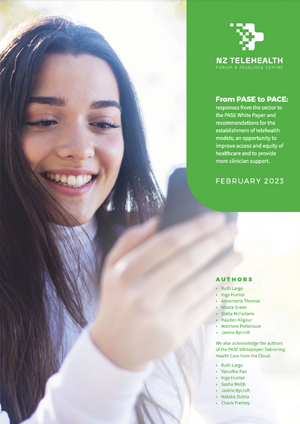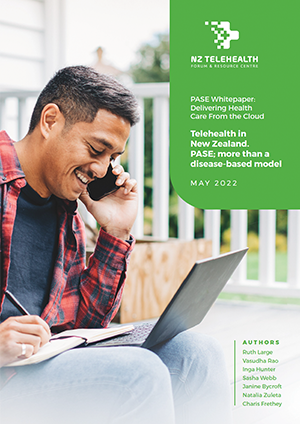PASE & PACE Whitepapers
Over the past two years, the NZ Telehealth Forum (NZTF) has seen rapid growth in activity across the country and has supported clinicians to provide telehealth services to their patients. Having conducted two previous National DHB Telehealth surveys (2014, 2019), with a third in the pipeline and having gathered extensive information from our working groups/communities of practice and national experts within the various NZTF groups, the NZTF is well placed to be setting achievable goals for the future of telehealth delivery in NZ.
2025 RPM@PACE
Remote Patient Monitoring (RPM) has emerged as a valuable, and cost-effective addition to modern healthcare, offering a means to monitor patients’ health remotely and provide timely interventions that improve or maintain the quality of care provided.
The Patient Anywhere, Clinician Elsewhere model further enhances RPM by enabling remote centralisation via a national, regional, or local hub of healthcare providers to deliver care from any location, thereby improving accessibility and efficiency.
This brief paper explores the application of the PACE model to RPM, highlighting its benefits, challenges, and prospects. The model is illustrated with three basic case examples and references are included.
Read RPM@PACE document.
2023 PACE Whitepaper
From PASE to PACE:
 Following the release of the 2022 PASE Whitepaper (see below), there was considerable feedback from individuals and organisations. This feedback has been compiled in an updated 2023 PACE whitepaper titled "From PASE to PACE". The most significant change is broadening the model from Specialist to Clinician.
Following the release of the 2022 PASE Whitepaper (see below), there was considerable feedback from individuals and organisations. This feedback has been compiled in an updated 2023 PACE whitepaper titled "From PASE to PACE". The most significant change is broadening the model from Specialist to Clinician.
The NZ Telehealth Forum makes the following recommendations:
1) Development of a PACE model interlinked with Infrastructure projects for a national health record, national booking systems, regional commissioning, rural networks and local hubs.
2) Development of clinical efficacy and safety guidance for those practising telehealth, including telehealth-specific quality of care metrics and evaluation of outcomes.
3) Establishment of national programmes of telehealth as foundational programmes of work rather than fixed-term pilots.
4) Integration of telehealth as a model of health care delivery targeted at increasing equity of access, including upskilling of local workforces, both clinical and non-clinical health workforces, to support effective delivery.
5) Inclusion of digital health mode of delivery within existing clinical qualification curricula along with the development of a nationally recognised micro-credential for non-clinical workers who support health care delivery in digital health literacy.
6) Establishment of a clinically led operational task force whose focus is the delivery of healthcare by telehealth, focusing on the areas identified in Te Pae Tata Interim Health Plan, to develop the PACE model.
7) Further work is done to consider a ‘Clinician Anywhere Clinician Elsewhere’ (CACE) telehealth model specifically for clinician-to-clinician support.
We are also proud to share that the PACE poster titled Creating PACE (Patient/whānau Anywhere, Clinician Elsewhere) Increasing access to equitable healthcare won the Te Tāhū Hauora Health Quality Safety Commission Symposium “Seed” poster award in early November 2023. Congratulations to Meghann Grawburg, Naomi Bondi (Lakes), Leisha Davies-Colley (Data & Digital), Annabelle Hastings (Tairāwhiti), Katy ONeill (Taranaki), Sara Jodache (Waikato), Gwen Kerrison (Waikato).
View the PACE poster.
2022 PASE Whitepaper
The Patient Anywhere Specialist Elsewhere (PASE) model of care
This white paper explores the possibilities for NZ to deliver healthcare in a better way. It offers a pathway to reducing inequity of healthcare delivery by harnessing the power of the health system reforms and making use of the decades of experience of the New Zealand Telehealth Leadership Group (NZTLG) in what we have termed the Patient Anywhere Specialist Everywhere (PASE) model.
Feedback: The authors would like to receive feedback through a short survey which will take about 5 minutes to complete. We encourage you to COMPLETE THE SURVEY.
Taking the PASE model forward
Based on our understanding of telehealth, we propose a preliminary processual model for operationalising PASE. It is vitally important that a full systems view is taken in order to avoid potential inequities. The true strength of this model will be seen in a whole of system/whānau/person implementation approach rather than a narrow disease or locality approach. If we can view PASE as a model to distribute regional resources nationally then we will reap the most benefit for our communities. A review of international and national models, especially in other OECD contexts can enable such insights and offer improvements and extensions to this model.
Long COVID
One such care model that spans multiple pathological processes and specialties to consider developing in urgency is a National long COVD-19 telehealth model. This model would allow patients anywhere to receive multi-disciplinary care provided by Specialists elsewhere, particularly when the natural course of new treatments is to centralise them. Given the impact of this disease and the need for timely support for sufferers, a service of this nature would make it an ideal national PASE model.




